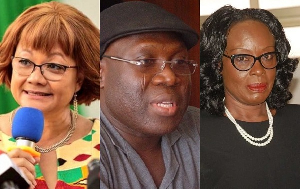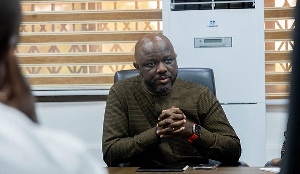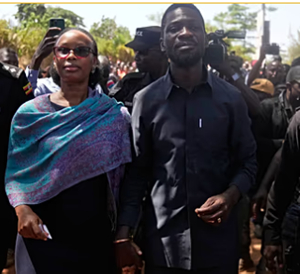By Dr. Michael J.K. Bokor
E-mail: mjbokor@yahoo.com
September 11, 2009
Political office holders (be they politicians or Foreign Service personnel) are known for living well at the expense of the tax-payer. After all, they don’t pay rent or bills for utility services; they don’t use their own cars on their numerous rounds nor do they lose any sleep over the cost of fuelling and maintaining those cars; and they earn good salaries and allowances too. Beyond all this largesse, they have every opportunity to make money by fair or foul means. And they latch onto those opportunities too. In effect, political office provides all that they need to support their lifestyles and pave the way for a brighter future.
I know of a politician who, well ensconced in this situation, accepted his fate and basked in the fortunes of political office. Then, by a slight quirk of circumstance, a sudden radio announcement dismissing him from office changed matters for him. And he stuttered out what turned out to make a lasting impression on many people: “Po… po… pol… Politics is a dir… dir… dirty game!”
Until that turning point in his political life, he pretended not to have known that fact. Just like him, those who walk the corridors of power, stuffing themselves with all the benefits therein always think that the political road is a one-way lane which they must walk to glory. They close their minds to everything in their quest for power and wealth until something drastically catastrophic happens to cut short their self-acquisitiveness and open them to all forms of punishment and public ridicule. By the time the wool falls off from their eyes, the harm would already have been done to their political careers (and lives, in some extreme cases). Ghana has had a lot of those politicians.
Within this context, I welcome the admonition from the Asantehene, Otumfuo Osei Tutu II, to political leaders to be always mindful of “a judgement day” in order not to allow political power to corrupt them.
As reported by JoyFmOnline, Otumfuo Osei Tutu gave the advice when Regional Ministers and their Deputies as well as Regional Co-ordinating Directors, who were attending a day’s workshop on public procurement planning and implementation, called on him at the Manhyia Palace on Wednesday, September 9.
The Asantehene was said to be particularly concerned about the award of contracts because, to him, that was one area in which Ministers could easily fall foul of the law. I agree totally with him. Any talk of “contracts” in government business evokes troubling sentiments because the award of contracts has become a fertile ground for milking the state through all kinds of unconscionable manouevres by those awarding the contracts and those to whom the contracts are awarded. The ubiquitous monster called “KICKBACKS” is at the heart of this contract business at all levels of government—local, municipal, metropolitan, regional, and national.
Harona Esseku’s loud outbursts of protestation against ex-President Kufuor over the hijacking of “kickbacks” at the Osu Castle might have caused the demise of his political career but the public ridicule engendered by that allegation will not abate soon. Ghanaians will continue to regard this allegation as something worth their bother because it smacks of the negative happenings in officialdom that our brand of politics breeds. The day of reckoning for somebody in this scenario will definitely dawn.
Unlike the Christian perspectives on the Judgement Day, which portray the occasion as an after-life Day of Reckoning, what awaits the corrupt politicians and all those occupying and abusing positions in the public sphere will take place right here on earth while they are living. They will be judged and punished if found wanting in accounting for their stewardship. That’s what the Asantehene is drawing attention to.
History has too many examples for anyone to recount. Ever since our indigenous politicians began ruling us, many of them have faced their Waterloo right in front of our eyes—some while still in office and others after they had left the scene. Without seeking to hurt anybody’s feelings, let me refer to the cases of all those whose assets were confiscated from the era of the National Liberation Council, National Redemption Council, Supreme Military Councils I and II, Armed Forces Revolutionary Council, and the Provisional National Defence Council to say that wrongdoing cannot escape punishment. These were military regimes whose drastic actions against civilian politicians and soldier-politicians alike should be a constant reminder to our political office holders of their fate.
In the civilian governments too, those who were probed by Commissions of Inquiry or investigated, prosecuted, and punished for abusing their offices are known as a sad reflection on the corruption that our politics engenders.
Politics is a slippery ground and those who enter there must know and be wary of the risks involved. To survive its whirligig and to ensure a peaceful life in retirement, our politicians must not pull the plank from under their own feet while in office. Otherwise, they will sink into big trouble. To me, that’s the import of the Asantehene’s message.
But the searchlight should not be on the politicians alone. Every Ghanaian, including the traditional rulers, should be circumspect in their dealings because there is “a judgement day” for everybody who is placed in a position of trust.
The matter worsens when our chiefs collude with our politicians to corrupt the system. Here is one instance, about which I will be brazen. During the ex-NPP era, we were told that the World Bank had given the Asantehene a loan of 35 million Dollars for development projects (especially the provision of potable water) for communities in the Ashanti Region. This loan was contracted in the name of Ghana and would be paid by the Ghana Government (invariably all Ghanaians contributing something to the country’s coffers). Many voices bitterly criticized this transaction but Kufuor and his government brushed the issue aside as inconsequential to them. The question is: What is the moral justification for such a transaction, knowing very well that individual chiefs are not eligible to contract any loan from the World Bank or the International Monetary Fund as had been done by Manhyia?
Our chiefs have particularly been cited for indulging in malpractices, the most disturbing of which is the underhand dealings in the sale of land. Some chiefs are known to have sold and re-sold one parcel of land to different buyers at different times. Others have arrogated state lands to themselves and disposed of them with impunity. It is difficult to rationalize issues, especially when some of the chiefs go the extra mile of impropriety to enter into unholy alliances with politicians to do weird things for personal gains. Our chiefs know very well that they are banned from partisan politics; but do they respect this Constitutional prohibition or injunction?
It is no exaggeration to say that the conduct of some of the chiefs in the recent electioneering process was (and still remains) reprehensible, especially in situations where they allowed themselves to be unduly influenced by the politicians through expensive gifts and huge sums of money whereupon they turned themselves into surrogates in their domains for those politicians. In that compromising situation, they forgot that what was being given them might have come from questionable sources. By this tacit complicity, our chiefs and prominent civil authorities who bowed to the pressure being put on them by the politicians cannot escape blame. They must purge themselves too. The hint of wrongdoing by the chiefs can be inferred from this statement by Obrifo Ahunaku Ahor Ankobea II, Omanhene of Gomoa Akyempim, when he spoke on Friday at a durbar at Gomoa Assin in the Gomoa West District in honour of President Atta Mills. Obrifo Ahor Ankobea appealed to the government to increase allowances paid to chiefs “to prevent them from employing dubious means to earn a living”. I contend that the “dubious means” mentioned by the chief could be in many forms, some of which are already known. The point is that a chief who indulges in dubious means to support his life is as guilty as the corrupt politician who is being advised by the Asantehene. And such a deviant chief’s “judgement day” will definitely dawn for him to be destooled and humiliated. Then, as the wearer of the shoe, he alone knows where it pinches.
Our leaders (politicians, traditional rulers, the clergy, diplomats, heads of institutions, associations, and groups—all and sundry) need to wake up to this reality that the Asantehene has brought up. There is too much rot in our system as everybody seeks to take advantage of his/her official position to make it in life through political connections. Unfortunately, though, the stark fact is that some people appear to be deepening this rot and condoning wrongdoing for personal gains but become outspoken against issues only when their own personal interests are not satisfied or are threatened. Such people are a danger to themselves and our democracy.
As the late A. A. Munufie once said, “Ghanaian politics is full of nonsense and those who want to participate in it must have a stomach for nonsense.” I daresay that it appears Ghana has too many people who are willing to develop the muscles of their stomachs to accommodate this nonsense.
Opinions of Monday, 14 September 2009
Columnist: Bokor, Michael J. K.














